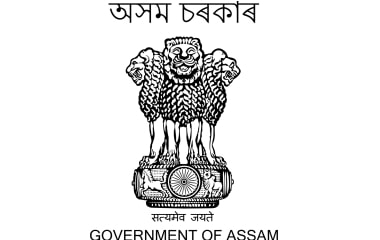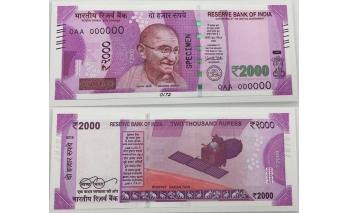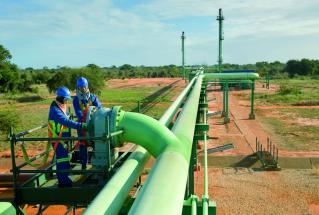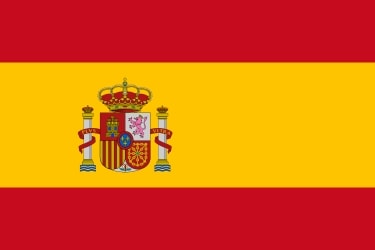▼ GoI, WB sign USD 200 million loan agreement for Assam economy [10-31-17]
 The Government of India and the World Bank signed a $200 million Loan Agreement for the Assam Agribusiness and Rural Transformation Project.
The Project will support the Government of Assam to facilitate agri-business investments, increase agriculture productivity and market access, and enable small farm holders produce crops that are resilient to recurrent floods or droughts in the state.
Assam is simplifying several regulatory procedures related to doing business, agricultural marketing, and fisheries amongst others.
The project will help the State increase agricultural productivity by strengthening the farming systems, raise private sector investments to promote agri-enterprises which will create better job opportunities for the youth in the State.
The Project will be implemented in over 16 Districts of Assam. Over 500,000 farming households will directly benefit from the Project.
At least 30 percent women are expected to participate in project activities. Specific focus will be given to women-led enterprises and their participation in the decision-making process of farmer producer organizations.
The focus on geographic clustering of the production base for certain commodities will help agri-enterprises take advantage of existing and future market opportunities that they may not necessarily achieve alone.
The cluster approach will allow for combining efforts, making use of synergies, and pooling resources to increase the competitive advantage of these products, while at the same time share the risks involved in introducing improved products or entering previously untapped markets.
Successful clusters will also continuously innovate and adapt ‘best practices’ across agricultural value chains.
Another key component of the project will be to promote market-led production that can deal with the vagaries of climate change.
Assam’s agriculture sector is highly vulnerable to climate variability and the state experiences recurrent floods and droughts.
Currently, more than 50 percent of the paddy growing areas are prone to flooding, submergence and drought. A market-led production system will take advantage of the rapidly changing market, introduce crops that are resilient to climate change, increase production and manage risks for farmers.
The $200 million loan from the International Bank for Reconstruction and Development (IBRD), has a 7-year grace period, and a maturity of 16.5 years. The Government of India and the World Bank signed a $200 million Loan Agreement for the Assam Agribusiness and Rural Transformation Project.
The Project will support the Government of Assam to facilitate agri-business investments, increase agriculture productivity and market access, and enable small farm holders produce crops that are resilient to recurrent floods or droughts in the state.
Assam is simplifying several regulatory procedures related to doing business, agricultural marketing, and fisheries amongst others.
The project will help the State increase agricultural productivity by strengthening the farming systems, raise private sector investments to promote agri-enterprises which will create better job opportunities for the youth in the State.
The Project will be implemented in over 16 Districts of Assam. Over 500,000 farming households will directly benefit from the Project.
At least 30 percent women are expected to participate in project activities. Specific focus will be given to women-led enterprises and their participation in the decision-making process of farmer producer organizations.
The focus on geographic clustering of the production base for certain commodities will help agri-enterprises take advantage of existing and future market opportunities that they may not necessarily achieve alone.
The cluster approach will allow for combining efforts, making use of synergies, and pooling resources to increase the competitive advantage of these products, while at the same time share the risks involved in introducing improved products or entering previously untapped markets.
Successful clusters will also continuously innovate and adapt ‘best practices’ across agricultural value chains.
Another key component of the project will be to promote market-led production that can deal with the vagaries of climate change.
Assam’s agriculture sector is highly vulnerable to climate variability and the state experiences recurrent floods and droughts.
Currently, more than 50 percent of the paddy growing areas are prone to flooding, submergence and drought. A market-led production system will take advantage of the rapidly changing market, introduce crops that are resilient to climate change, increase production and manage risks for farmers.
The $200 million loan from the International Bank for Reconstruction and Development (IBRD), has a 7-year grace period, and a maturity of 16.5 years.
|
▼ INR 2.11 lakh crore infused in bank recap programme [10-26-17]
 Government announced an aggressive INR 2.11 lakh crore capital infusion plan for public sector banks reeling under bad loans over a period of two years.
Bank recapitalisation, as the name suggests, means recapitalising banks with new capital to improve their balance sheet.
The government, using different instruments, infuses capital into banks undergoing credit crunch.
Capital is the money invested by shareholders in the business.
Since the government is the biggest shareholder in public sector banks, the responsibility of infusing capital majorly lies with the government.
The recapitalisation plan comes into action when banks get caught in a situation where their liabilities are comparatively higher than their assets.
The liquidity with banks is a liability as it is the money deposited by customers, which needs to be paid sooner or later.
Due to this their balance-sheet weakens and banks find it difficult to raise capital from the open market.
The government, which is also the biggest shareholder, can infuse capital in banks by either buying new shares or by issuing bonds.
Recapitalisation: Know More Government announced an aggressive INR 2.11 lakh crore capital infusion plan for public sector banks reeling under bad loans over a period of two years.
Bank recapitalisation, as the name suggests, means recapitalising banks with new capital to improve their balance sheet.
The government, using different instruments, infuses capital into banks undergoing credit crunch.
Capital is the money invested by shareholders in the business.
Since the government is the biggest shareholder in public sector banks, the responsibility of infusing capital majorly lies with the government.
The recapitalisation plan comes into action when banks get caught in a situation where their liabilities are comparatively higher than their assets.
The liquidity with banks is a liability as it is the money deposited by customers, which needs to be paid sooner or later.
Due to this their balance-sheet weakens and banks find it difficult to raise capital from the open market.
The government, which is also the biggest shareholder, can infuse capital in banks by either buying new shares or by issuing bonds.
Recapitalisation: Know More
- The government is currently focused on maintaining its fiscal deficit at 3.2%.
- This means that the government cannot take out money from state coffers and give it to banks. Hence, the government bifurcated the entire INR 2.11 lakh crore amount in two parts.
- A government bond is an instrument to raise money from the market with a promise to pay to repay the face value of the maturity date and a periodic interest.
- A bond issued for the purpose of recapitalisation is called recapitalisation bonds.
- The government will issue recapitalisation bonds, which banks will subscribe and enter it as an investment in their books.
- The banks will lend money to the government for subscribing the bonds. This money raised by the government through these bonds will go back to banks as capital.
- This will immediately strengthen the balance-sheet of the banks and show capital-adequacy.
- Since the government is always solvent, the money lent to the government for subscribing recap bonds is free from becoming a bad loan.
|
▼ India, Mozambique to collaborate on gas field development [10-23-17]
 India and Mozambique agreed to expedite development of the giant Rovuma gas discovery, which is planned to be converted into LNG for exports.
ONGC Videsh Ltd, the overseas arm of state-owned Oil and Natural Gas Corp (ONGC), holds 16 per cent stake in Mozambique offshore block Rovuma Area 1.
Oil India Ltd has 4 per cent stake while a unit of Bharat Petroleum Corp Ltd (BPCL) holds 10 per cent stake.
The Area 1 covers roughly 10,000 square kilometre area and is located in northernmost part of offshore Mozambique Rovuma Basin.
According to OVL, second and final exploration phase for Area-1 ended on January 31, 2015 and have resulted in five discoveries, with combined recoverable resource of about 60 trillion cubic feet.
Area-1 represents one of the largest natural gas discoveries in offshore East Africa and has the potential to become one of the world's largest LNG producing hubs.
Area-1 plans to develop initially two LNG trains of capacity 6 million tonnes per annum each.
Area-1 is working towards taking final investment decision (FID) as quickly as possible.
Area-1 has also incorporated Mozambique LNG1 Company Pte Ltd in Singapore to oversee marketing and shipping activities of LNG from first 2 trains of Golfinho-Atum field.
The partners are negotiating with buyers for conversion of existing non-binding Heads of Agreements (HOAs) to Sales Purchase Agreements (SPAs). Area-1 targets to raise up to USD 12-15 billion through project finance. India and Mozambique agreed to expedite development of the giant Rovuma gas discovery, which is planned to be converted into LNG for exports.
ONGC Videsh Ltd, the overseas arm of state-owned Oil and Natural Gas Corp (ONGC), holds 16 per cent stake in Mozambique offshore block Rovuma Area 1.
Oil India Ltd has 4 per cent stake while a unit of Bharat Petroleum Corp Ltd (BPCL) holds 10 per cent stake.
The Area 1 covers roughly 10,000 square kilometre area and is located in northernmost part of offshore Mozambique Rovuma Basin.
According to OVL, second and final exploration phase for Area-1 ended on January 31, 2015 and have resulted in five discoveries, with combined recoverable resource of about 60 trillion cubic feet.
Area-1 represents one of the largest natural gas discoveries in offshore East Africa and has the potential to become one of the world's largest LNG producing hubs.
Area-1 plans to develop initially two LNG trains of capacity 6 million tonnes per annum each.
Area-1 is working towards taking final investment decision (FID) as quickly as possible.
Area-1 has also incorporated Mozambique LNG1 Company Pte Ltd in Singapore to oversee marketing and shipping activities of LNG from first 2 trains of Golfinho-Atum field.
The partners are negotiating with buyers for conversion of existing non-binding Heads of Agreements (HOAs) to Sales Purchase Agreements (SPAs). Area-1 targets to raise up to USD 12-15 billion through project finance.
|
▼ Russia to block access to crypto-currencies [10-11-17]
 Russia will block access to websites of exchanges that offer crypto-currencies such as Bitcoin, Russian Central Bank.
Russian financial authorities initially treated any sort of money issued by non-state approved institutions as illegal, saying they could be used to launder money.
Later the authorities accepted the globally booming market of crypto-currencies but want to either control the turnover or to limit access to the market
The central bank sees rising interest in crypto-currencies because of high returns from buying into such instruments.
The crypto-currencies gradually transform into high-yielding assets from being a mean of payment.
Bitcoin, the most well-known virtual currency that emerged in mid-2010, last traded at around USD 4,807, up from its initial price of less than USD 1.
For businesses the usage of such crypto-currencies as an investment object carries unreasonably high risks.
Russian authorities said they would like to regulate the use of crypto-currencies by Russian citizens and companies. Russia will block access to websites of exchanges that offer crypto-currencies such as Bitcoin, Russian Central Bank.
Russian financial authorities initially treated any sort of money issued by non-state approved institutions as illegal, saying they could be used to launder money.
Later the authorities accepted the globally booming market of crypto-currencies but want to either control the turnover or to limit access to the market
The central bank sees rising interest in crypto-currencies because of high returns from buying into such instruments.
The crypto-currencies gradually transform into high-yielding assets from being a mean of payment.
Bitcoin, the most well-known virtual currency that emerged in mid-2010, last traded at around USD 4,807, up from its initial price of less than USD 1.
For businesses the usage of such crypto-currencies as an investment object carries unreasonably high risks.
Russian authorities said they would like to regulate the use of crypto-currencies by Russian citizens and companies.
|
▼ Catalan independence claims thrown out by Spain’s Constitutional Court [10-6-17]
 Spain’s Constitutional Court on 5th Oct 2017 ordered the suspension of Monday’s session of the regional Catalan parliament, throwing into doubt its plans to declare unilateral independence from Spain.
The speaker of the Catalan parliament, Carme Forcadell, accused the Madrid government of using the courts to deal with political problems and said the regional assembly would not be censored.
But she said parliamentary leaders had not yet decided whether to defy the central court and go ahead with the session.
The suspension order further aggravated one of the biggest crises to hit Spain since the establishment of democracy on the 1975 death of General Francisco Franco.
But Spanish markets rose on perceptions the order might ward off, at least for now, an outright independence declaration.
Spanish Prime Mariano Rajoy called on Catalan leader Carles Puigdemont to drop independence plans or risk “greater evils”.
Secessionist Catalan politicians have pledged to unilaterally declare independence at the Oct 2 session after Oct 1's referendum, banned by Madrid and marked by violent scenes where Spanish police sought to hinder voting.
The constitutional court said it had agreed to consider a legal challenge filed by the anti-secessionist Catalan Socialist Party.
Spanish shares and bonds, hit by the political turmoil in Catalonia, strengthened after the news of the court’s decision.
The main IBEX stock index rose 2.5 percent and the yield on Spain’s 10-year bond fell.
The Spanish government will approve a decree on Friday making it easier for companies to transfer their legal base out of Catalonia. Spain’s Constitutional Court on 5th Oct 2017 ordered the suspension of Monday’s session of the regional Catalan parliament, throwing into doubt its plans to declare unilateral independence from Spain.
The speaker of the Catalan parliament, Carme Forcadell, accused the Madrid government of using the courts to deal with political problems and said the regional assembly would not be censored.
But she said parliamentary leaders had not yet decided whether to defy the central court and go ahead with the session.
The suspension order further aggravated one of the biggest crises to hit Spain since the establishment of democracy on the 1975 death of General Francisco Franco.
But Spanish markets rose on perceptions the order might ward off, at least for now, an outright independence declaration.
Spanish Prime Mariano Rajoy called on Catalan leader Carles Puigdemont to drop independence plans or risk “greater evils”.
Secessionist Catalan politicians have pledged to unilaterally declare independence at the Oct 2 session after Oct 1's referendum, banned by Madrid and marked by violent scenes where Spanish police sought to hinder voting.
The constitutional court said it had agreed to consider a legal challenge filed by the anti-secessionist Catalan Socialist Party.
Spanish shares and bonds, hit by the political turmoil in Catalonia, strengthened after the news of the court’s decision.
The main IBEX stock index rose 2.5 percent and the yield on Spain’s 10-year bond fell.
The Spanish government will approve a decree on Friday making it easier for companies to transfer their legal base out of Catalonia.
|
▼ India receives most remittances: World Bank [10-5-17]
 India is expected to retain its position as the top remittances receiving country, with its diaspora set to pump in a whopping USD 65 billion in the year 2017.
Ahead of the annual meeting of the International Monetary Fund and the World Bank, a report issued by the global lender said that remittances, which include flows to high-income countries, are projected to grow by 3.9 per cent to USD 596 billion.
After India the other top five remittances receiving countries are China (USD 61 billion), the Philippines (USD 33 billion), Mexico (USD 31 billion), and Nigeria (USD 22 billion).
However, as a share of gross domestic product (GDP) for 2017, the top five recipients are smaller countries—the Kyrgyz Republic, Haiti, Tajikistan, Nepal, and Liberia.
Remittances growth to the South Asia region, the bank said will be moderate at 1.1 per cent to USD 112 billion this year, due to continuing impact of lower oil prices and 'nationalisation' polices leading to constrained labor market conditions in the Gulf Cooperation Council (GCC) countries.
Remittances to India, the world’s largest remittance recipient, will grow by 4.2 per cent in 2017 to USD 65 billion, following a decline of nine per cent in 2016.
India, in 2016, received remittances amounting to USD 62.7 billion.
Flows to Pakistan are expected to remain flat this year, while Sri Lanka, Bangladesh and Nepal will see a decline.
Remittances to the region will grow by a weak 2.6 per cent to USD 114 billion in 2018, the bank said. India’s remittances in 2018 is expected to grow at 2.5 per cent.
According to the bank, the economic slowdown in the GCC has adversely impacted migrant worker flows from the South Asia Region.
For Pakistan, registered migrant workers in Saudi Arabia dropped from 522,750 in 2015 to 462,598 in 2016; those in the United Arab Emirates fell from 326,986 in 2015 to 295,647 in 2016.
With only 89,624 registered for Saudi Arabia up to July 2017, a steep fall in Pakistani migration to that country is anticipated.
The number of Indian workers emigrating to Saudi Arabia dropped from 306,000 in 2015 to 162,000 in 2016; those going to the United Arab Emirates decreased from 225,000 in 2015 to 159,000 in 2016.
Total Indian worker outflows fell from 781,000 in 2015 to 506,000 in 2016, the bank said.
Bangladesh, on the other hand, bucked the trend somewhat given earlier Saudi plans for recruitment of 400,000 workers (half of them female) from Bangladesh. India is expected to retain its position as the top remittances receiving country, with its diaspora set to pump in a whopping USD 65 billion in the year 2017.
Ahead of the annual meeting of the International Monetary Fund and the World Bank, a report issued by the global lender said that remittances, which include flows to high-income countries, are projected to grow by 3.9 per cent to USD 596 billion.
After India the other top five remittances receiving countries are China (USD 61 billion), the Philippines (USD 33 billion), Mexico (USD 31 billion), and Nigeria (USD 22 billion).
However, as a share of gross domestic product (GDP) for 2017, the top five recipients are smaller countries—the Kyrgyz Republic, Haiti, Tajikistan, Nepal, and Liberia.
Remittances growth to the South Asia region, the bank said will be moderate at 1.1 per cent to USD 112 billion this year, due to continuing impact of lower oil prices and 'nationalisation' polices leading to constrained labor market conditions in the Gulf Cooperation Council (GCC) countries.
Remittances to India, the world’s largest remittance recipient, will grow by 4.2 per cent in 2017 to USD 65 billion, following a decline of nine per cent in 2016.
India, in 2016, received remittances amounting to USD 62.7 billion.
Flows to Pakistan are expected to remain flat this year, while Sri Lanka, Bangladesh and Nepal will see a decline.
Remittances to the region will grow by a weak 2.6 per cent to USD 114 billion in 2018, the bank said. India’s remittances in 2018 is expected to grow at 2.5 per cent.
According to the bank, the economic slowdown in the GCC has adversely impacted migrant worker flows from the South Asia Region.
For Pakistan, registered migrant workers in Saudi Arabia dropped from 522,750 in 2015 to 462,598 in 2016; those in the United Arab Emirates fell from 326,986 in 2015 to 295,647 in 2016.
With only 89,624 registered for Saudi Arabia up to July 2017, a steep fall in Pakistani migration to that country is anticipated.
The number of Indian workers emigrating to Saudi Arabia dropped from 306,000 in 2015 to 162,000 in 2016; those going to the United Arab Emirates decreased from 225,000 in 2015 to 159,000 in 2016.
Total Indian worker outflows fell from 781,000 in 2015 to 506,000 in 2016, the bank said.
Bangladesh, on the other hand, bucked the trend somewhat given earlier Saudi plans for recruitment of 400,000 workers (half of them female) from Bangladesh.
|